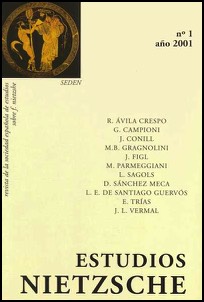Nietzsche y Ortega
DOI:
https://doi.org/10.24310/EstudiosNIETen.vi1.8835Keywords:
Ortega, generación del 98, razónAbstract
Nietzsche comienza a entrar en España en una época de crisis histórica, que coincide culturalmente con la denominada ‘Generación del ‘98’. La inspiración nietzscheana es apreciable en el contexto literario, político y social del ‘98 español; pero, a mi juicio, no debe pasar desapercibida su relevancia filosófica. Este artículo explora como el interés por la filosofía del ‘98 tiene diversos y peculiares registros, que constituyen valiosas aportaciones al pensamiento contemporáneo, en gran parte debido a la influencia de Nietzsche, y cuya trascendencia llega hasta Ortega, quien los transformará y reorientará de un modo magistral.
Downloads
Metrics
References
Conill, J. , "Concepciones de la experiencia", Diálogo filosófico, nº 41 (1998), 148-170.
Conill, J., El crepúsculo de la metafísica, Barcelona: Anthropos, 1988.
Conill, J., El enigma del animal fantástico, Madrid: Tecnos, 1991.
Garragorri, P., La filosofía española en el siglo XX, Madrid: Alianza, 1985.
Laín Entalgo, P., El cuerpo humano, Madrid: Espasa-Calpe, 1989.
Lain Entralgo, P, Idea de hombre, Barcelona: Galaxia Gutenberg/Círculo de Lectores, 1996.
Laín Entralgo, P. , Esperanza en tiempo de crisis, Barcelona: Círculo de Lectores/Galaxia Gutenberg, 1993.
Lain Entralgo, P., Cuerpo y alma, Madrid: Espasa Calpe, Madrid, 1991.
Lain Entralgo, P., Cuerpo, alma y persona, Barcelona: Galaxia Gutenberg/Círculo de Lectores, Barcelona, 1995).
Marías, J., Ortega, circunstancia y vocación, I, Madrid: Revista de Occidente, 1973
Marina, J.A., Teoría de la inteligencia creadora, Barcelona: Anagrama, 1993.
Nietzsche, F., Así habló Zaraustra, tr. A. Sánchez Pascual, Madrid, Alianza, 1985.
Orringer, N.R., Ortega y sus fuentes germánicas, Madrid: Gredos, 1979.
Rukser, U. Nietzsche in der Hispania, Bern/München: Francke, 1962.
Sobejano, G., Nietzsche en España, Madrid: Gredos, 1967.
Downloads
Published
How to Cite
Issue
Section
License
As of issue 21 (2021) this journal is published only in open access (diamond route).
From that number 21, like the previous numbers published in NIETZSCHE STUDIES, they are subject to the Creative Commons Acknowledgment-NoComercia-ShareIgual 4.0 license, the full text of which can be consulted at <http://creativecommons.org/licenses/by-nc-sa/4.0 >
It is the responsibility of the authors to obtain the necessary permissions of the images that are subject to copyright.
This work is licensed under a Creative Commons Attribution-NonCommercial-ShareAlike 4.0 International License.
Copyright generates two different rights: moral rights and patrimonial rights that EJFB recognizes and respects. Moral rights are those relating to the recognition of the authorship. They are rights of a personal nature that are perpetual, inalienable, unseizable and imprescriptible as consequence of the indivisible union of the author and his/her work.
Patrimonial rights are those that can be derived from the reproduction, distribution, adaptation or communication of the work, among others.







11.png)
